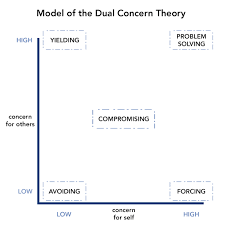Negotiation - Conflict Resolution and Strategic Orientation
How Disposition toward Conflict Affects Negotiation Strategy
- Marketing, Advertising, Sales & PR
- Accounting, Taxation, and Reporting
- Professionalism & Career Development
-
Law, Transactions, & Risk Management
Government, Legal System, Administrative Law, & Constitutional Law Legal Disputes - Civil & Criminal Law Agency Law HR, Employment, Labor, & Discrimination Business Entities, Corporate Governance & Ownership Business Transactions, Antitrust, & Securities Law Real Estate, Personal, & Intellectual Property Commercial Law: Contract, Payments, Security Interests, & Bankruptcy Consumer Protection Insurance & Risk Management Immigration Law Environmental Protection Law Inheritance, Estates, and Trusts
- Business Management & Operations
- Economics, Finance, & Analytics
Approach to Conflict Resolution Affects Negotiation Strategy
The conflicting interests of parties to a negotiation can be presented in a two-dimensional framework, known as a dual-concern model. The model provides a negotiators concerns for personal outcomes and the outcomes of others independently. It demonstrates how parties arrive at a disposition toward conflict resolution (competition, avoidance, collaboration, accommodation, or compromise) which will ultimately affect the strategy and tactics employed in the negotiation.
What is the Dual Concern Model?
Five major strategies for conflict management have been identified in the dual concerns model:
- Contending (also called competing or dominating).
- Yielding (also called accommodating or obliging).
- Inaction (also called avoiding).
- Problem solving (also called collaborating or integrating).
- Compromising - Demonstrates an intention to engage in the back-and-forth that characterizes negotiation.
The strategy employed by a negotiator to resolve a conflict with vary depending upon the aforementioned characteristics or differences between negotiators. Further, a negotiators strategy will vary depending upon characteristics of the negotiation (level of dependence, integrative/distributive) and the negotiators alternatives.
Related Topics
- What is negotiation?
- What scenarios or situations lead to a negotiation or cause parties to negotiate?
- What characteristics are common to all negotiations?
- What are the differences among negotiators that affect the negotiation process?
- What is a conflict and how does it give rise to negotiation?
- How is a negotiators disposition toward conflict resolution related to negotiation strategy?
- What is the level of dependence in a conflict negotiation?
- What are integrative, distributive, and compatible bargaining scenarios?
- What is the BATNA and what is the significance of alternatives in negotiation?
- What is the significance of the reservation point and ZOPA in a negotiation?
- What is the significance of concessions or adjustment of the bargaining position?
- What are anchor points and the bargaining range in a negotiation?
- What personal and situational factors are commonly understood to affect negotiation?
